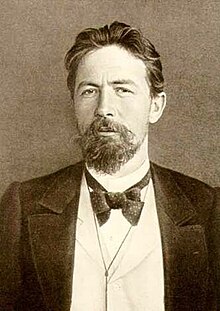Dreams (Chekhov)
Dreams ( Russian Мечты , Metschty ) is a short story by the Russian writer Anton Chekhov , which appeared on November 15, 1886 in the St. Petersburg daily Novoje wremja .
The two village policemen Nikandr Ssaposchnikow and Andrej Ptacha bring a slender vagabond, who keeps his name to himself, to the district town on foot. The tramp with a shaved head and in chains with good reason hides his name. If he names him, he will be sent back to prison. Otherwise he will be sent to Eastern Siberia at most or will receive up to forty blows. On the march there is enough time for the conversation: Aha, it dawns on the police, so you’re coming out of the prison?
The tramp, a well-bred, polite person, is happy to answer all of Andrej Ptacha's questions, except those about the name. The police, the tramp's mother, a serf, found out that she had poisoned her master with arsenic because he had taken another. Mamachen was imprisoned for twenty years and the son for seven years because the then 18-year-old had handed his supposed father the glass with the “effervescent powder”. The tramp had served four of the seven years. Then he had managed to escape. Now, on the march to the district town, the passionate fisherman dreams of the abundance of fish in the East Siberian rivers. In Eastern Siberia everything will be better than in the European part of Russia, through which he is currently marching. It seems that the two policemen are dreaming with them - until the time when the hitherto silent Nikandr Ssaposhnikov doubts whether the tramp - skin and bones - will survive the long march to Eastern Siberia.
German-language editions
Output used:
- Dreams , pp. 51–60 in Anton Chekhov: Happiness and other stories. Translated from the Russian by Alexander Eliasberg . 187 pages. Wilhelm Goldmann Verlag, Munich 1962, Goldmann's yellow paperbacks, vol. 868
Web links
- The text
- online in the Gutenberg-DE project
- Мечты (Чехов) (Russian)
- online at Lib.ru / LITRA / CHEHOW (Russian)
- Chekhov Bibliography, Entry Stories No. 439 (Russian)
- Notice of first publication in the Labor der Fantastik (Russian)
- Entry in WorldCat
